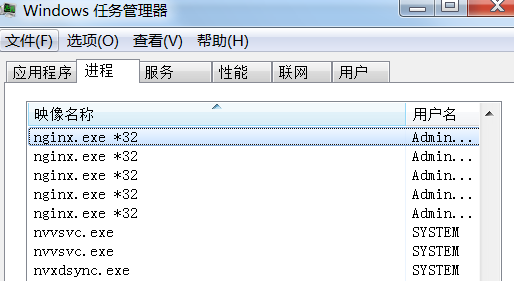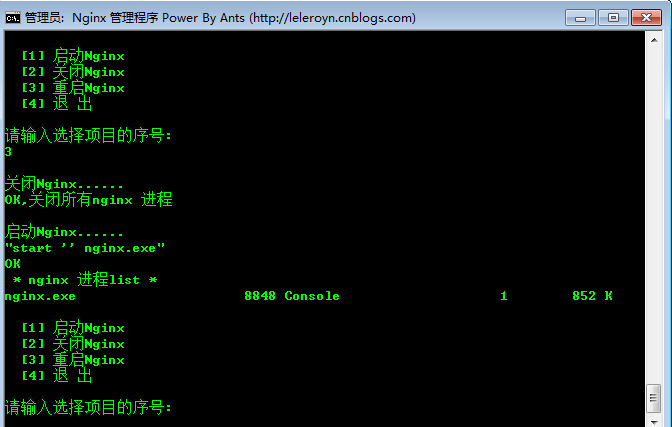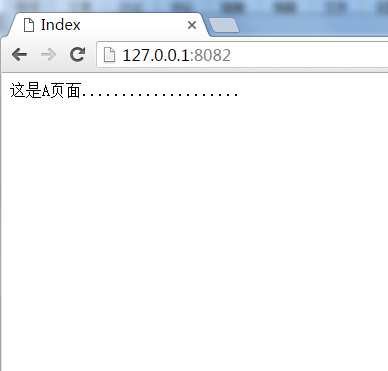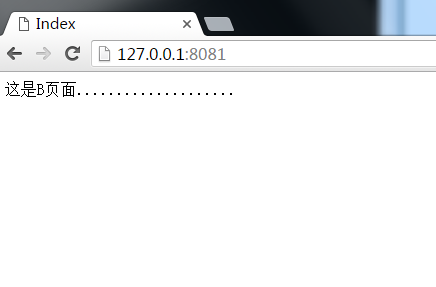nginx+iis使用
一、nginx的介绍
nginx是由俄罗斯人开发的一款高性能的http和反向代理服务器,也可以用来作为邮件代理。相比较于其他的服务器,具有占用内存少,稳定性高等优势
Nginx相关地址
源码:https://trac.nginx.org/nginx/browser
二、nginx的配置
nginx常用命令:
nginx -s stop 快速关闭Nginx,可能不保存相关信息,并迅速终止web服务。
nginx -s quit 平稳关闭Nginx,保存相关信息,有安排的结束web服务。
nginx -s reload 因改变了Nginx相关配置,需要重新加载配置而重载。
nginx -s reopen 重新打开日志文件。
nginx -c filename 为 Nginx 指定一个配置文件,来代替缺省的。
nginx -t 不运行,而仅仅测试配置文件。nginx 将检查配置文件的语法的正确性,并尝试打开配置文件中所引用到的文件。
nginx -v 显示 nginx 的版本。 nginx -V 显示 nginx 的版本,编译器版本和配置参数。
启动服务:

或者直接运行 nginx.bat 如图:

如果未启动服务成功可以查看logs文件下error文件日志
常见错误信息
No mapping for the Unicode character exists in the target multi-byte code page:表示文件目录中含有中文字符,建议直接放在C盘根目录下
An attempt was made to access a socket in a way forbidden by its access permissions:表示80端口,可以去配置将80端口更改为别的端口或者去注册表里面禁用80端口,这里不建议去注册表禁用80端口,因为禁用后iis所有的站点将会无法启动
这里是在本机测试,先去iis新建两个站点,端口分别为8081和8082



三、nginx的配置介绍
nginx主要配置文件是在conf/nginx.conf里面
主要配置信息如下
#user nobody; worker_processes 4; #nginx进程数,建议设置为等于CPU总核心数 #error_log logs/error.log; #error_log logs/error.log notice; #error_log logs/error.log info; #pid logs/nginx.pid; events { worker_connections 1024; #单个进程最大连接数(最大连接数=连接数*进程数) } http { include mime.types; default_type application/octet-stream; #log_format main '$remote_addr - $remote_user [$time_local] "$request" ' # '$status $body_bytes_sent "$http_referer" ' # '"$http_user_agent" "$http_x_forwarded_for"'; #access_log logs/access.log main; sendfile on; #tcp_nopush on; #keepalive_timeout 0; keepalive_timeout 65; #gzip on; #服务器集群名称为Jq_one upstream ngintest.com{ server 127.0.0.1:8081 weight=4; server 127.0.0.1:8082 weight=4; } server { listen 8088; server_name ngintest.com; #charset koi8-r; #access_log logs/host.access.log main; location / { root html; index index.aspx index.html index.htm; #指向集群名称为Jq_one proxy_pass http://ngintest.com; #设置主机头和客户端真实地址,以便服务器获取客户端真实IP proxy_set_header Host $host; proxy_set_header X-Real-IP $remote_addr; proxy_set_header X-Forwarded-For $proxy_add_x_forwarded_for; } #静态资源缓存设置 location ~ \.(jpg|png|jpeg|bmp|gif|swf|css)$ { expires 30d; root /nginx-1.9.3/html;#root: break; } #error_page 404 /404.html; # redirect server error pages to the static page /50x.html # error_page 500 502 503 504 /50x.html; location = /50x.html { root html; } # proxy the PHP scripts to Apache listening on 127.0.0.1:80 # #location ~ \.php$ { # proxy_pass http://127.0.0.1; #} # pass the PHP scripts to FastCGI server listening on 127.0.0.1:9000 # #location ~ \.php$ { # root html; # fastcgi_pass 127.0.0.1:9000; # fastcgi_index index.php; # fastcgi_param SCRIPT_FILENAME /scripts$fastcgi_script_name; # include fastcgi_params; #} # deny access to .htaccess files, if Apache's document root # concurs with nginx's one # #location ~ /\.ht { # deny all; #} } # another virtual host using mix of IP-, name-, and port-based configuration # #server { # listen 8000; # listen somename:8080; # server_name somename alias another.alias; # location / { # root html; # index index.html index.htm; # } #} # HTTPS server # #server { # listen 443 ssl; # server_name localhost; # ssl_certificate cert.pem; # ssl_certificate_key cert.key; # ssl_session_cache shared:SSL:1m; # ssl_session_timeout 5m; # ssl_ciphers HIGH:!aNULL:!MD5; # ssl_prefer_server_ciphers on; # location / { # root html; # index index.html index.htm; # } #} }
upstream ngintest.com{
server 127.0.0.1:8081 weight=4;
server 127.0.0.1:8082 weight=4;
}
表示要负载均衡的站点,多个站点可在里面增减,
weight表示访问权重值,值越大表示访问到的几率越大
listen 8088;
表示nginx要监听的端口,这里由于iis默认会占用80端口,所以这里要改成除80以外端口
server_name ngintest.com;
服务器名称,这里服务器名称要和upstream后面的名称一致
全部配置好后重启nginx服务
浏览器访问:127.0.0.1:8088,多次刷新会在两个站点来回切换





 浙公网安备 33010602011771号
浙公网安备 33010602011771号